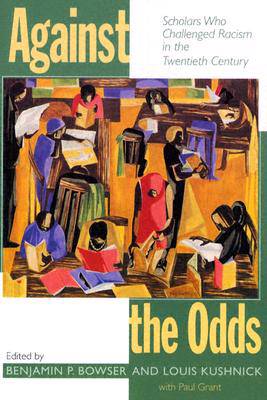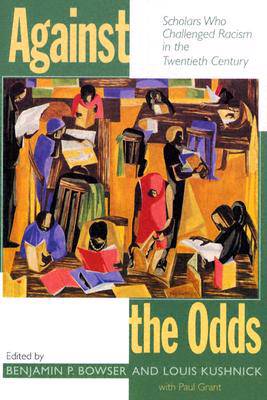
Door een staking bij bpost kan je online bestelling op dit moment iets langer onderweg zijn dan voorzien. Dringend iets nodig? Onze winkels ontvangen jou met open armen!
- Afhalen na 1 uur in een winkel met voorraad
- Gratis thuislevering in België vanaf € 30
- Ruim aanbod met 7 miljoen producten
Door een staking bij bpost kan je online bestelling op dit moment iets langer onderweg zijn dan voorzien. Dringend iets nodig? Onze winkels ontvangen jou met open armen!
- Afhalen na 1 uur in een winkel met voorraad
- Gratis thuislevering in België vanaf € 30
- Ruim aanbod met 7 miljoen producten
Zoeken
Against the Odds
Scholars Who Challenged Racism in the Twentieth Century
Paul Grant
Paperback | Engels
€ 34,95
+ 69 punten
Omschrijving
Over the course of the past century the struggle against racism took many forms, from petitions and lawsuits to sit-ins and marches. This book records the testimony of eleven scholar-activists who challenged prevailing racial beliefs and practices while engaging in resistance and reform. Included in this group are nine African Americans (Kenneth B. Clark, John Henrik Clarke, St. Clair Drake, W.E.B. Du Bois, John Hope Franklin, John Glover Jackson, Hylan Lewis, Frank Snowden Jr., and Robert C. Weaver); one Sri Lankan who lives and works in Britain (A. Sivanandan); and one white American (Herbert Aptheker). Most of these men began their careers before World War II, in a time when biological conceptions of race dominated public policy and severely limited the opportunities available to people of color. By struggling with these impediments in their personal and professional lives, each in his own way helped redefine race as the social and cultural construct it has always been. To highlight both the similarities and the differences in their experiences, the editors asked each of the subjects the same set of general questions about formative influences, major obstacles, and principal accomplishments. These were followed by more narrowly focused queries about specific writings. Most of the responses were recorded on tape as interviews; several were submitted as written reminiscences; and one, the essay on Du Bois, as the shared recollection of two associates who had worked closely with him for many years. The result is a singular collection of autobiographical accounts that not only testify to the personal courage of these individuals in overcoming the ravages of racism but also document their contributions to the establishment of a vital antiracist tradition in American thought and culture.
Specificaties
Betrokkenen
- Auteur(s):
- Uitgeverij:
Inhoud
- Aantal bladzijden:
- 264
- Taal:
- Engels
Eigenschappen
- Productcode (EAN):
- 9781558494749
- Verschijningsdatum:
- 3/11/2004
- Uitvoering:
- Paperback
- Formaat:
- Trade paperback (VS)
- Afmetingen:
- 164 mm x 215 mm
- Gewicht:
- 417 g

Alleen bij Standaard Boekhandel
+ 69 punten op je klantenkaart van Standaard Boekhandel
Beoordelingen
We publiceren alleen reviews die voldoen aan de voorwaarden voor reviews. Bekijk onze voorwaarden voor reviews.











